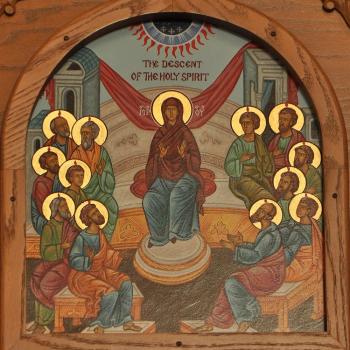
Christ’s sending the Spirit at Pentecost is often misunderstood. Some erroneously believe that until then, the Spirit had not been very active in the world. This is not what the Christian faith teaches. The Spirit has always been active, and, as Scripture says, goes where she wills. Throughout all history, the Spirit has inspired people, giving them grace, helping them to be holy. We see this, for example, with the prophets, for they spoke in and through the Spirit, proving that the Spirit was working in the world before the advent of Christ. The Spirit is the Spirit of life, and, as the Spirit of life, she touches all those who have life. She is everywhere present and filling all things, making sure everyone has the potential for holiness. Sin can and does get in the way of our relationship with the Spirit, which is why, before the incarnation, before Christ dealt with sin in a temporal manner, the gifts of the Spirit were adversely affected by our sin (personal and communal), so that its presence was not always so easily discerned. Indeed. the greatest gifts the Spirit can impart, like deifying grace, were impeded. Sin had to be dealt with, and it was, eschatologically, in and through the death, resurrection and ascension of Jesus. This allowed the world to have a new experience of the Spirit, one which is presented to us at Pentecost. As Jesus is the immanent eschaton, as in him the fullness of the eschaton is made present even in time, those who find themselves incorporated into him, joined in and with him so that they can be said to be a part of his mystical body, can find the Spirit upon them, revealing in and through them eschatological signs to the world.
Thus, the Holy Spirit can be said to have always been involved with human history. Before the incarnation, she was helping direct and prepare it for the coming of Christ, and now, after, the Spirit can and does increase her work in the world, especially in and through those who have joined themselves to Christ. Thus, instead of seeing Pentecost as when the Spirit first came into the world, St Leo confirms it was the time when the Spirit’s gifts were multiplied in and among the faithful, signified by the miraculous events on the day itself:
If this faith is firmly held, I say, let us not doubt that, when on the day of Pentecost the Holy Spirit filled the disciples, it was not the beginning of the gift but an addition to his generosity. The patriarchs, the prophets, the priests, and all the saints who lived in former times were invigorated by the sanctifying of the same Spirit. Without this grace no mysteries were ever instituted, no rites celebrated, for there was always the same strength of grace although there was not the same measure of the gifts. [1]
We should open ourselves to the Spirit as the Spirit is the Spirit of Christ. We can become anointed in him, christs in Christ, and when we do so, we are expected to partake of the greatness of the Spirit, to be signs of the Spirit to the world. As we partake of the Spirit, we should find that various gifts the Spirit gave throughout history, like the ones the prophets had, can be ours. We should welcome the Spirit coming up upon us and developing in us the gifts which were already there, at least in potential, so now that they can be actualized and used in abundance:
He, on the fiftieth day after the Resurrection of the Lord, came down on the apostles and the crowd of believers, as they hoped. They hoped, indeed, because the Lord Jesus had promised the Spirit would come, not that then for the first time he should begin to live in the saints, but that he might inflame even more fervently the hearts consecrated to himself and might flow over them more abundantly. He was increasing his gifts, not simply beginning them.[2]
God created all things good, with the intent that everyone and everything, in their relative distinctions, but also in and as one integrated whole, should receive deifying grace. Even when creation was cut off from this eschatological end through temporal sin, the Spirit was at work, making sure that the eschatological goal could eventually by actualized. First, she prepared the world, and its history, for the immanent eschaton, the incarnation of the God-man. Then, through the work of Christ, she is sent back into the world, bringing greater and greater graces, so that history can properly lead to God’s intended end for it, which is for it to be deified. The church, when properly understood, represents the place where all that sin has divided and broken down can come together and be made one in the eschaton, and those who in time, find themselves in the church, are meant to participate in the Spirit and work with her to help the rest of creation receive the blessings intended for it. The fullness of the church, therefore, must not be confused with institutional forms, though the church can and will be found in them, for by doing so, the church becomes a tool of exclusion instead of inclusion. But if the church is meant to serve the Spirit and the work of the Spirit in history, we must avoid such an exclusive mentality for it will prevent the church from fulfilling its temporal purpose. And so, all history, before and after the incarnation, serves, in its own way, for the realization of that goal:
It is transmitted by the fathers that, at the moment when the saints are caught up by the divine bidding to be raised to that blessed state as a result of encountering our Lord whose power attracts them <to himself>, like a magnet that draws in to itself flakes of iron, then all the legions of the heavenly hosts, and the choirs of the descendants of Adam, will be gathered together as a single Church. And then the goal of the Creator’s intention will be fulfilled, <a goal> towards which he had been looking since the beginning of the world’s coming into being, <from the time> when he was creating the created world in grace. It is to this outcome that he has been looking during the entire drawn-out course of this world, with its distinctive features, <a world> that, with its changes, was serving rational beings, as its lord. But in the courts of the kingdom they will henceforth find delight, in the world that has no end or alteration in the enjoyment of its life. [3]
This is why it is important for us not to think of the Spirit as coming to the world only after Jesus’ ascension, though we can and in some ways metaphorically discuss her coming into the world in this way. We should understand that the Spirit was the world from the very beginning and continues to be in and with it to this day, giving not only life, but holiness, making sure that life itself is holy. In every age, in every locale, holy men and women can be found, thanks to the work of the Holy Spirit. Of course, we must understand, before Pentecost, the way the Spirit engaged the world differed from the ways she can and does so afterward, for with Pentecost, the time of preparation was over. We can now have a new relationship with the Spirit. Not everyone does, to be sure, because many, even believers, have yet to learn to properly develop their relationship with the Spirit – but there are those who, like St Francis or St Seraphim of Sarov, find themselves so joined in and developed by the Spirit, their holiness is difficult, if not impossible to ignore. We see in them that what was started at Pentecost continues to this day, indeed, we can in and through them that the Spirit always provides us signs that she is at work in the world, always rendering to it something new, something greater than we have seen before.
[1] St Leo the Great, Sermons. Trans. Jane Patricia Freeland CSJB and Agnes Josephine Conway SSJ (Washington, DC: CUA Press, 1996), 336 [Sermon 76].
[2] St Leo the Great, Sermons, 341 [Sermon 77].
[3] St. Isaac of Nineveh, Headings on Spiritual Knowledge (The Second Part, Chapters 1-3). Trans. Sebastian Brock (Yonkers, NY: St Vladimir’s Seminary Press, 2022), 84 [Chapter 3; First Discourse].
Stay in touch! Like A Little Bit of Nothing on Facebook.
If you liked what you read, please consider sharing it with your friends and family!
N.B.: While I read comments to moderate them, I rarely respond to them. If I don’t respond to your comment directly, don’t assume I am unthankful for it. I appreciate it. But I want readers to feel free to ask questions, and hopefully, dialogue with each other. I have shared what I wanted to say, though some responses will get a brief reply by me, or, if I find it interesting and something I can engage fully, as the foundation for another post. I have had many posts inspired or improved upon thanks to my readers.












